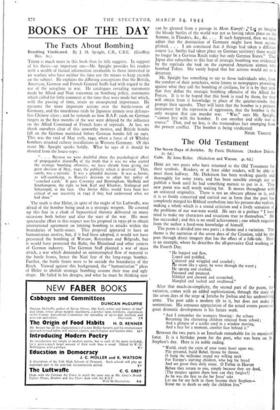BOOKS OF THE DAY
The Facts About Bombing
THERE is much more in this book than its title suggests. In support of his thesis—an important one—Mr. Spaight provides his readers with a wealth of factual information invaluable to those interested in air warfare who have neither the time nor the means to keep records on the subject. He explains the differing conceptions that the British, American, German and French General Staffs had with regard to the use of the aeroplane in war. He catalogues revealing statements made by Allied and Nazi statesmen on bombing policy, statements which called for little comment at the time they were made but which, with the passing of time, attain an unsuspected importance. He recounts the more important actions over the battle-towns of Germany, and the murderous raids by Japanese airmen over defence- less Chinese cities ; and he reminds us how R.A.F. raids on German targets in the first months of the war were delayed by the influence on the Allied Command of French fears of reprisals. At last, we shook ourselves clear of this unworthy motive, and British bombs fell on the German mainland before German bombs fell on ours. This was the raid of May ttth, 1940, when a force of 18 Whitley bombers attacked railway installations in Western Germany. Of this event Mr. Spaight speaks boldly. What he says of it should be shouted from the house-tops :
. Because we were doubtful about the psychological effect of propagandist distortion of the truth that it was we who started the strategic bombing offensive, we have shrunk from giving our great decision of May, 1940, the publicity which it deserved. That, surely, was a mistake. It was a splendid decision. It was as heroic, as self-sacrificing, as Russia's decision to adopt her policy of ' scorched earth.' It gave Coventry and Birmingham, Sheffield and Southampton, the right to look Kiel and Kharkov, Stalingrad and Sebastopol; in the face. Our Soviet Allies would have been less critical of our inactivity in 1942 if they had understood what we had done."
The truth is that Hitler, in spite of the might of his Luftwaffe, was afraid of the bomber being used as a strategic weapon. He covered up this fear in a cloak of hypocritical rhetoric delivered on many occasions both before and after the start of the war. His most spectacular effort in this respect was his proposal in 1935-36 to obtain international agreement on limiting bombing to attacks within the boundaries of battle-zones. This proposal appeared to have an humanitarian motive, but, if it had been adopted, it would not have prevented the bombing of Warsaw, Rotterdam and Belgrade, but it would have protected the Ruhr, the Rhineland and other centres of German industry. The German Staff planned a war of mass attack, a war which demanded an uninterrupted flow of material to the battle fronts, hence the Nazi fear of the long-range bomber. Further, the battle fronts were to be outside the boundaries of the Reich. Viewed against this background, the " humanitarian " pleas of Hitler to abolish strategic bombing assume their true and ugly shape. He failed in his designs, and what he must be thinking now
can be gleaned from a passage in Mein Kampf: ."Lg us imagine the bloody battles of the world war not as having taken place on the Somme, in Flanders, &c., &c.... If such happened, then we mu,: admit that the destruction of Germany might have been accom- plished.. . I am convinced that if things had taken a different course (i.e. battles had taken place on German territory) there would no longer be a German Reich today but only German States." That Japan also subscribes to this fear of strategic bombing was evidenced by the reprisals she took on the captured American airmen who bombed Tokyo. She vainly hoped that her actions would act as a deterrent.
Mr. Spaight has something to sly to those individuals who, from the comfort of their armchairs, write letters to newspapers protesting against what they call the bombing of civilians, for- it is by that term that they define the strategic bombing offensive of the Allied Air Forces. It is to be hoped that this book is read by them, for they will obtain from it knowledge in place of the quarter-truths that prompt their squeaks. They will learn that the bomber is a primary instrument for the repression of aggression, that the bomber is the only weapon that can murder war. "War," says Mr. Spaight, " cannot live with the bomber. It can smother and stifle war at source." That, and no less, is the tremendous fact emerging from the present conflict. The bomber is being vindicated.
NIGEL TANGYE.


























 Previous page
Previous page